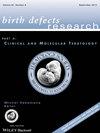Recent studies reported an association between prenatal propylthiouracil exposure and birth defects, including abnormal arrangement across the left–right body axis, suggesting an association with heterotaxy syndrome.
This case–control and case-finding study used data from 1981 to 2013 from the EUROCAT birth defect registry in the Northern Netherlands. First, we explored prenatal exposures in heterotaxy syndrome (cases) and Down syndrome (controls). Second, we describe the specific birth defects in offspring of mothers using propylthiouracil (PTU) prenatally.
A total of 66 cases with heterotaxy syndrome (incidence 12.1 per 100,000 pregnancies) and 783 controls with Down syndrome (143.3 per 100,000 pregnancies) were studied. No differences in intoxication use during pregnancy were found between cases and controls, including smoking (28.0% vs. 22.7%; p = 0.40), alcohol (14.0% vs. 26.9%; p = 0.052), and recreational drugs (0 vs. 0.3%; p = 1.00). We found an association between heterotaxy syndrome and prenatal drug exposure to follitropin-alfa (5.6% vs. 1.1%; p = 0.04), and drugs used in nicotine dependence (3.7% vs. 0.2%; p = 0.02). Five mothers used PTU during pregnancy and gave birth to a child with trisomy 18, renal abnormalities, or hypospadias and cardiac defects.
This study identified follitropin-alfa and drugs used in nicotine dependence as possible teratogens of heterotaxy syndrome. Our data suggest the possibility that there is an increased risk of birth defects (including renal, urological, and cardiac abnormalities) in children born among mothers taking PTU prenatally, but not for heterotaxy syndrome. Birth Defects Research (Part A) 106:573–579, 2016. © 2016 Wiley Periodicals, Inc.


